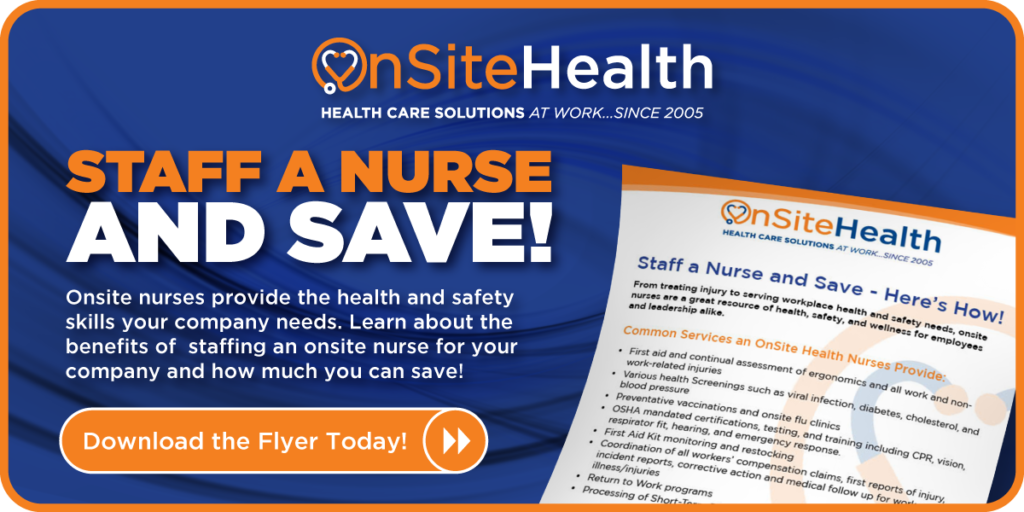Heart disease continues to be the leading cause of death in the United States with an estimated 659,000 people dying each year. However, there are strategies that you can begin practicing to help protect your heart. In honor of American Heart Month, our OnSite Health nurses have compiled 8 strategies for preventing heart disease that you can begin today!
What is a Good Blood Pressure Reading Anyway? Learn More in Our Blog
Risk Factors for Heart Disease
While there are some factors that cannot be changed such as age, family history, or sex, there are several health issues that can put people at a higher risk. According to the Centers for Disease Control and Prevention, about 47% of Americans have at least one of these risk factors.
- High Blood Pressure
- High Cholesterol
- Smoking
- Diabetes
- Being Overweight
- Unhealthy diet
- Physical inactivity
- Excessive alcohol use
Actions to Take in Preventing Heart Disease
Stop Smoking and Tobacco Use
Whether you smoke cigarettes or use smokeless tobacco, both have a dangerous impact on the heart. From damaging blood vessels and heart to increasing blood pressure and heart rate, tobacco use not only makes the body work harder but it also leads to an increased risk for heart attack and stroke.
Exercise
Regular, daily exercise has many benefits including lowering your risk of heart disease. It is recommended to aim for at least 30 to 60 minutes of daily exercise, but if you need to slowly work up to these goals, consider the following:
- 2.5 hours a week of moderate aerobic exercise
- 75 minutes a week of vigorous aerobic exercise
- At least two strength training sessions per week
While these numbers may look intimidating, it is important to remember that just moving around will help you meet these goals. Your daily activities like walking the dog, housekeeping, and taking the stairs at work will also help your health.
Eat a Heart-Healthy Diet
Eating a well-balanced diet will help prevent heart disease, improve blood pressure, cholesterol, and reduce your risk for type 2 diabetes. To begin healthy eating, it can start by limiting sugar, salt, and processed foods and replacing those with fruits, vegetables, and whole grains. For a detailed nutrition plan, check out our blog, Improve Your Nutrition: 6 Tips from OnSite Health Coaches.
Manage Stress
Stress and heart health go hand in hand. High stress can raise your blood pressure and be a trigger for a heart attack. Physical attack, meditation, and relaxation activities can help you manage stress and improve your health.
Sleep Well
Most adults need 7 to 9 hours of sleep per night. Not enough sleep raises your risk of high blood pressure, heart attack, obesity, and diabetes. Try setting a sleep schedule and stick to it so that your body is going to bed and waking up at the same time each day. If you have frequent sleep problems, reach out to your health care provider to see if there is another problem impacting your health such as sleep apnea.
Limit Alcohol
Like processed foods, too much alcohol can cause weight gain and raise your blood pressure which in turn increases your risk for heart disease. Men should limit their alcohol consumption to no more than 2 drinks per day and women should have not more than one.
Lower Cholesterol
High cholesterol can clog your arteries and raise your risk of coronary heart disease and heart attack. Healthy eating, weight management, and getting regular physical activity can help lower your cholesterol levels. In addition, your physician may be able to prescribe a medication to help get your cholesterol levels under control.
Get Regular Health Screenings
Understanding your health is the first step in managing it. Regular health screenings will allow doctors to provide treatment before symptoms worsen. OnSite Health’s workplace screening program consists of tests for heart health, blood pressure, cholesterol, glucose, and vision.
Improve Workplace Heart Health with OnSite Health Nurses
At OnSite Health, our team of on-site nurses work with employees to prevent, treat, and manage conditions that lead to heart disease. In addition to preventing heart disease, our nurses help organizations navigate workplace health and safety protocols as well as provide expertise to employees in meeting their personal health and nutrition goals. To learn more about the Benefits of OnSite Health nurses, contact our team for a customized quote for your business needs.

